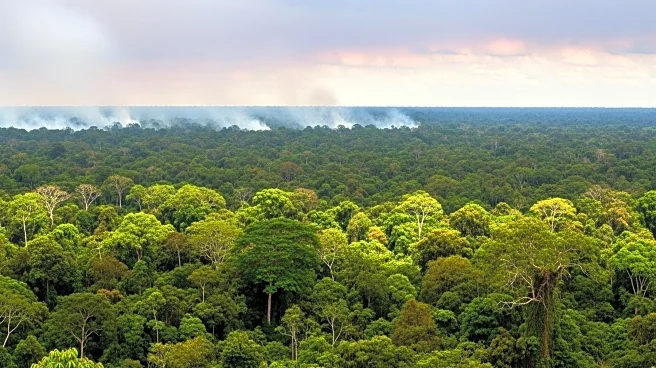What is the story about?
What's Happening?
Recent research highlights the severe impact of wildfires in the Amazon on both the environment and human health, particularly affecting Indigenous communities. Bolivian park ranger Marcos Uzquiano describes the devastation caused by these fires, which not only destroy biodiversity but also lead to respiratory infections and other health issues due to smoke exposure. The study, published in Communications Earth and Environment, emphasizes the importance of preserving Amazonian forests to protect against diseases and maintain ecological balance. It underscores the role of Indigenous lands in reducing fire risks and conserving forests, noting that legally recognized Indigenous territories experience less deforestation. Bolivia, which experienced record forest loss in 2024, is second only to Brazil in terms of wildfire-driven deforestation.
Why It's Important?
The findings underscore the critical need for forest conservation as a means of safeguarding public health and mitigating climate change. The Amazon's health is vital not only for local communities but also for global ecological stability. Indigenous lands, when legally protected, serve as effective barriers against deforestation, thus preserving biodiversity and carbon storage. The study suggests that securing Indigenous land rights could significantly enhance forest conservation efforts, providing substantial economic and environmental benefits. The ongoing political climate in Bolivia, with potential policy shifts towards individual land titles, poses a threat to these conservation efforts, potentially undermining Indigenous autonomy and increasing deforestation risks.
What's Next?
With the upcoming Cop30 UN climate summit in Brazil, there is hope for international collaboration to address the transnational impacts of Amazonian wildfires. Researchers advocate for frameworks that align forest protection with Indigenous stewardship and fire mitigation strategies. The political situation in Bolivia remains uncertain, with potential policy changes that could affect Indigenous land rights. The outcome of these political developments will be crucial in determining the future of forest conservation and Indigenous autonomy in the region.
Beyond the Headlines
The study highlights the broader implications of forest conservation on human health, suggesting that protecting forests can prevent diseases linked to smoke exposure and deforestation. The economic valuation of ecosystem services provided by Indigenous lands could further bolster arguments for their protection. However, the effectiveness of these measures depends on the implementation of real programs and projects that support Indigenous resilience and forest stewardship.

















